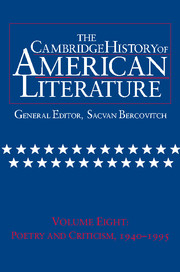Book contents
- Frontmatter
- Introduction
- Poetry, Politics, and Intellectuals
- Criticism since 1940
- Introduction
- 1 Politics and American Criticism
- 2 The Emergence of Academic Criticism
- 3 The Nationalizing of the New Criticism
- 4 The Canon, the Academy, and Gender
- 5 Deconstruction and Poststructuralism
- 6 From Textuality to Materiality
- 7 Cultural and Historical Studies
- Conclusion: Academic Criticism and its Discontents
- Appendix II: Biographies of Critics
- Chronology 1940–1995
- Bibliography
- Index
1 - Politics and American Criticism
from Criticism since 1940
Published online by Cambridge University Press: 28 March 2008
- Frontmatter
- Introduction
- Poetry, Politics, and Intellectuals
- Criticism since 1940
- Introduction
- 1 Politics and American Criticism
- 2 The Emergence of Academic Criticism
- 3 The Nationalizing of the New Criticism
- 4 The Canon, the Academy, and Gender
- 5 Deconstruction and Poststructuralism
- 6 From Textuality to Materiality
- 7 Cultural and Historical Studies
- Conclusion: Academic Criticism and its Discontents
- Appendix II: Biographies of Critics
- Chronology 1940–1995
- Bibliography
- Index
Summary
In a widely discussed report published in 1984, National Endowment for the Humanities Chairman William J. Bennett deplored the new politicization of literary study in academic criticism and university curricula. The report, entitled To Reclaim a Legacy, attacked new trends in literary criticism and theory, which Bennett claimed had dislodged the canon of great books that traditionally had been at the center of the American curriculum in favor of a fashionable mixture of media studies and minority writing. Bennett would return to this line of attack two years later, when as Secretary of Education under Ronald Reagan he complained that, throughout U.S. institutions of higher education, professors were promoting critical ideas, methods, and vocabularies that took literature away from students and the general public and turned it into the private preserve of a specialized academic coterie. In phrases that strikingly echoed the Republican campaign rhetoric of the moment, Bennett charged that such critics and criticism had sacrificed the “common culture” of Americans to the aims of “special interest groups.”
In 1988, Bennett’s successor at the Endowment, Lynne V. Cheney, revived Bennett’s charges in Humanities in America, a report “to the President, the Congress, and the American People.” Cheney extolled “the remarkable flowering of the humanities” in state humanities councils and public festivals – everywhere, in fact, but in the universities, where she too found the public interest being sacrificed to narrow professional specialization and partisan identity politics. In literary studies particularly, she observed, “the key questions are thought to be about gender, race, and class, and truth and beauty and excellence are regarded as irrelevant.”
- Type
- Chapter
- Information
- The Cambridge History of American Literature , pp. 265 - 280Publisher: Cambridge University PressPrint publication year: 1996

